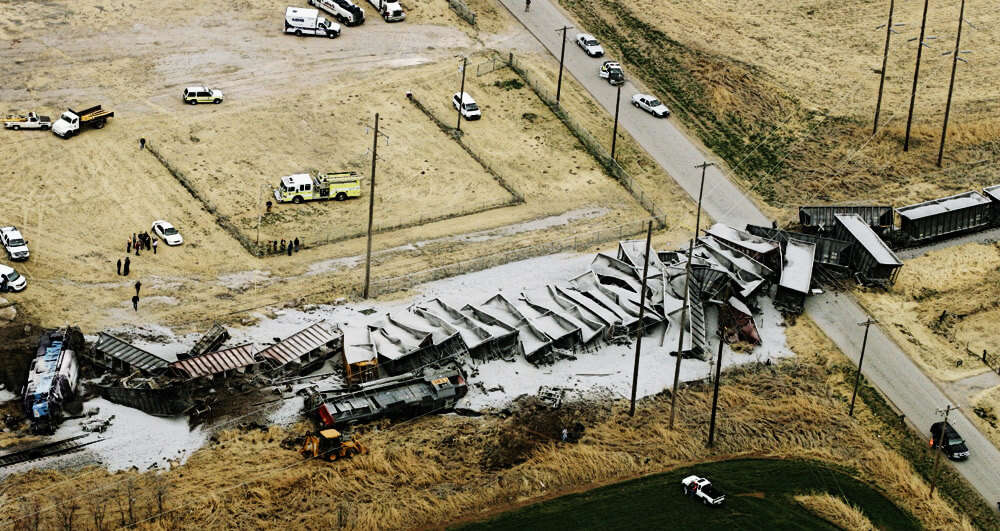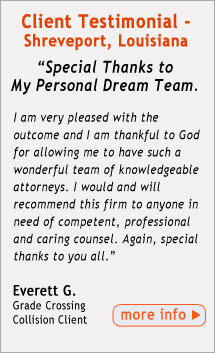Railroad Crossing Collisions
When a locomotive hits a big heavy truck like an 18 wheeler at a grade crossing, conductors and engineers on board can get hurt badly. Read this page to understand how railroad conductors and engineers can protect themselves before, during and after a crossing collision.
What railroad employees need to know about protecting themselves legally and financially in the event of a railroad grade crossing collision:
Before You Hit the Road!
Get Uninsured Motorist and Personal Injury Protection on Your Own Auto Insurance Coverage.We recommend that railroad conductors and engineers all opt in for substantial Uninsured Motorist and Personal Injury Protection on their own personal auto insurance. It's a little known fact that most UM/UIM or PIP policies should cover you in any motor vehicle accident even if you are not in the insured vehicle when the wreck occurs. This includes your train, since an engine is legally a motor vehicle, when it is involved in an accident with a truck who illegally fouls the track.
Even though eighteen wheelers and other large commercial trucks are required to carry more insurance than regular passenger vehicles, in many grade crossing collision cases the damages may exceed the policy limits. In some instances semi-trucks are only required to have about $750,000 in liability insurance. The train's property damage alone may exceed this amount since most locomotives are valued well over $1 million dollars. Learn more about UM/UIM and PIP for railroad workers>>
Note: Before purchasing additional UM/UIM/PIP, please confirm with your insurance agent that their insurance will cover you in a van wreck and train wreck while at work for the railroad.
If you are in a crossing collision:
Make note of these vital pieces of information if possible:Clearly, if you are badly injured you may not be able to do anything except wait for or seek medical attention. However, if you are able to note any of the information below it will aid in the speedy investigation of your case:
- The name of the negligent semi-truck driver: Having the name of the negligent truck driver is extremely helpful in locating the official law enforcement accident report. Law enforcement isn't very consistent on listing the engineer of the train as a driver so often times the only way to locate the report is by searching the truck driver's name.
- The DOT number on the door of the truck and/or the name of the trucking company: Identifying the trucking company is helpful in knowing where to send the lien letter to preserve vital information from the trucking company as noted below.
- The law enforcement divisions that work the accident: If you aren't able to find out the name of the negligent 18 wheeler driver, knowing which law enforcement division works the wreck can help you or your attorney find that information later.
- The names of any witnesses: Law enforcement doesn't always have the resources to talk to more than just the principals involved in a railroad crossing collision. Take the name and number of any witnesses if you get the chance. These days, witnesses may even have video which could become important evidence later.

After the accident:
Make your crossing collision claim as soon as possible:
Here are three reasons we recommend starting your crossing collision claim as soon as possible:
- Preserve critical data and evidence: If agressive action is not taken, the trucking company may overwrite videos and other vital data. That's why when we are hired to prosecute a grade crossing collision case for an injured railroad employee, we act immediately to preserve this critical information. Learn more below...
- Limited coverage:Although semi-trucks have more coverage than the average motorists, damages from collision with a train still often exceed their policy limits. Be aware that the railroad is going to make a claim for any property damage they are due with great expediency. It's important to let the trucking company and their insurance know that there are other injured parties that will have a financial claim as a result of the accident.
- Injured worker benefits generally last one year: In addition, your injured railroad worker benefits will only last so long. Starting your claim early can help you to get fairly compensated before your benefits expire or soon thereafter.
Hire the right attorney:
After handling hundreds of grade crossing collision cases for injured railroad workers, we have developed an extremely successful protocol that helps maximize the recovery for the injured railroad employee.
When involved in a crossing accident, critical decisions must be made to ensure the best possible results for physical and financial recovery. Handling multiple defendants and insurance companies can be a big challenge. If you are a trainman injured in a railroad crossing accident, it's important to work with a FELA Attorney who has extensive experience in these types of collisions. See the bottom of the page for railroader crossing collision testimonials. You may also Contact us today for references from satisfied grade crossing collision clients.
The best railroad crossing collision attorneys take immediate action to preserve vital data.
The first thing we do is act immediately to preserve evidence that may not be available if aggressive action is not taken. Filing an immediate lien letter with the trucking company puts them on notice to preserve driver's logs, cell phone records, GPS records and truck event recorders.
Truck event recorders and dash cam videos in particular are often overwritten if this information is not specifically requested and eventually ordered to be shared by a court of law. This evidence can help prove that the trucking company was not only 'negligent' but 'grossly negligent' which will help minimize any arguments that the railroader was contributorily at fault and maximize injured railroad worker's recovery in mediation or at trial.
Railroad Grade Crossing Collision Frequently Asked Questions
- What if the railroad claim agent says they will make a claim against the trucking company for me?
The minute you've been in a crossing accident, your financial interests and the railroads are potentially at odds. The railroad is required to provide you a safe place to work, and although the truck driver is usually the most culpable party, in many cases the railroad itself may have negligently contributed to your injury. In addition, the coverage available from the trucking company's insurance may not be enough to pay all damages they have caused. For these reasons it's best by far to obtain your own representation.
- Should I let the railroad claim agent pay my medical bills directly?
Recently, railroad claim agents have been offering to pay injured worker medical bills directly. But to do this they often require the injured employee to sign a medical release, which makes it easier for them to look for an alleged pre-existing condition and/or to visit illegally with your doctor and direct your medical care.
- Will I get in trouble with the railroad if I hire a lawyer to handle my crossing collision case?
Suffering an injury in a railroad crossing collision and reporting it is a protected activity under the Federal Railroad Safety Act. In addition, OSHA recently ruled that hiring a FELA attorney is also a protected activity. Harrassing a railroad employee for hiring an attorney is against the law. Our most satisfied clients tend to be those who let us handle their case from the very beginning.
Railroad Grade Crossing Collision Testimonials
- Mr. Michael V. Railroad Crossing Collision Client, Fort Worth, Texas
- Mr. Everett G. Grade Crossing Collision Client, Shreveport, Louisiana
- Mr. Reginald Hobley, Railroad Crossing Collision Client, Natchitoches, Louisiana
Grade Crossing Collision Case Summaries
Here are a few case summaries from some of the 100s of grade crossing collision cases we have handled over the years.
Settlement for Kansas City Southern Engineer Injured in Grade Crossing Collision.A KCS engineer operating a switch engine suffered a serious back injury when a tractor-trailer drove in front of the train causing the collision. Although there was no derailment, the KCS engineer was thrown around in the collision and wrenched his back due to slack. Prior to the collision, the KCS engineer was blowing the horn and ringing the bell. The trucking company blamed the layout of the crossing and the KCS crew.
As a result of the injury, the KCS engineer needed an operation on his back and could not return to work. The trucking company and KCS claimed the employee’s injury was not caused by the wreck and that the railroad worker could still hold a job. The case was settled approximately one (1) year after the injury. The railroad worker was represented by Mr. Bristol Baxley. Mr. Baxley is a partner in the law firm of Rome, Arata & Baxley. Hill v. Savage Industries et al.
Settlement for Union Pacific Engineer, Conductor and Brakeman Injured in Grade Crossing Collision.A UP engineer, conductor and brakeman were seriously injured in a grade crossing collision in Canadian County, Oklahoma when a dump truck hauling a load of sand drove in front of their train. In the ensuing derailment, the engineer sustained life threatening injuries, including a burst fracture to his spine. The conductor also suffered severe injuries to his back and other parts of his body. The brakeman suffered herniated disks in his neck as well as puncture wounds and lacerations. Prior to the collision, the KCS engineer was blowing the horn and ringing the bell. The trucking company blamed the layout of the crossing and the KCS crew.
As a result of his injuries, the engineer underwent emergency surgery to repair the damage to his spine and could not return to work. The conductor underwent multiple back surgeries and was also unable to return to work. Due to his injuries, the brakeman was unable to return to his job at the railroad. The case was settled about 1 year and 6 months after the accident. Further, as part of the settlement agreement, UP paid all of the Railroad Workers’ medical bills. The Railroad Workers were represented by lead attorney, Mr. Bristol Baxley of the law firm of Rome, Arata & Baxley. Smith, et al. v. Schwarz Ready Mix & Union Pacific, et al.
Settlement for Amtrak On Board Service Worker Injured in Eagle Lake, Texas Grade Crossing Collision.A 59 year-old Amtrak on board employee suffered a back injury in a grade crossing collision. The train derailment was caused by a tractor-trailer that drove in front of the train. The injury resulted in a back surgery.
The trucking company and Amtrak claimed the employee’s injury was not caused by the wreck and that the railroad worker could still hold a job. Mims v. National Railroad Passenger Corporation d/b/a Amtrak et. al. The Railroad worker was represented by Mr. Bristol Baxley of Rome, Arata & Baxley.
Judge awards Verdict to Kansas City Southern Engineer Injured in Denton, Texas Grade Crossing Collision.A KCS engineer operating a road engine suffered a serious neck injury after a City of Denton Garbage Truck ran a stop sign and caused a collision. Although there was no derailment, the KCS engineer was thrown around in the collision and fell back into the fire wall due to slack. Prior to the collision, the KCS engineer was blowing the horn and ringing the bell.
As a result of the injury, the KCS engineer needed an operation on his neck and could not return to work. The City of Denton and KCS claimed the employee’s injury pre-existed the wreck and accused him of fraud. After initially agreeing with the engineer’s memory of the incident, the Conductor in the case changed his story and claimed that the collision would not have spilled a coke and further, that the Engineer remained seated the entire time. The City of Denton and KCS also spent over $70,000 on expert testimony trying to prove their case. All of these experts testified that the accident in question could not have caused the type of injuries suffered by the Engineer.
The Judge in the case found the City 90% at fault for causing the accident. He also found the railroad 10% at fault because the Conductor saw the approaching truck was not going to stop but did not warn the Engineer. The judge awarded damages for the Engineer’s injuries including past and future lost wages, pain and suffering and medical bills.
The railroad worker was represented by Mr. Bristol Baxley of Rome, Arata & Baxley. Robinson vs the City of Denton, KCS and Donaciano Camargo. State District Court, Denton County, Texas.
Settlement for Kansas City Southern Conductor and Engineer Injured in Tractor-Trailer Train Collision.The Plaintiffs, a thirty-two year old conductor and a forty-two year old engineer for The Kansas City Southern Railway Company, suffered injury when struck by a tractor-trailer while operating a locomotive. The wreck occurred when the driver of the tractor-trailer stopped his truck on the KCS tracks directly in the path of the on-coming train. The train was blowing its horn and had all of its warning lights on. As a result, the engineer had to undergo back surgery and will never return to the railroad. The conductor underwent surgery and is unable to return to work for the railroad.
The conductor settled and engineer settled the case for at mediation. Frazier, et al. v. East Coast Live Stock Express Inc. and The Kansas City Southern Railroad, In the United States District Court, Eastern District of Texas. Bristol Baxley and Blake Arata of Rome, Arata & Baxley for the Plaintiffs.
If you'd like additional information on results obtained for railroad workers involved in grade crossing collisions please call us at toll free at 1-866-993-0001.
Vital Information for Injured Railroad Workers
- How to Fill Out an Accident Report
- How to Give a Statement to the Railroad Claim Agent
- 7 Vital Tips for an Injured Railroad Worker
Railroad Injuries
- Railroad Crossing Collisions
- Railroad Van Wrecks
- Train Collisions
- Amtrak Derailments and Collisions
- Switch Throwing
- Slips and Trips
- Getting On and Off Equipment
- Defective Handbrakes or other Safety Appliances
Long Term Conditions Caused by Railroad work
Where We Operate
We handle FELA/Railroad Injury cases across the United States. However, the bulk of our cases are in Texas and Louisiana and especially in these cities:Texas
Louisiana
Railroad Worker Resources
- FELA FAQs
- Railroad Whistleblower Info
- Federal Employers Liability Act
- FRA Statutes and Regulations
- Federal Railroad Administration
- Railroad Injuries
Injured Railroad Worker Benefits
- Short Term Railroad Disability Benefits
- Long Term Railroad Retirement and Disability Benefits
- Railroad Medical Benefits
- Recommended Optional Benefits
 ROME ARATA & BAXLEY L.L.C.
ROME ARATA & BAXLEY L.L.C.
